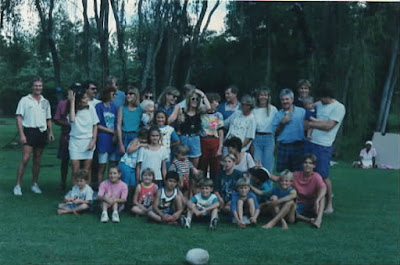What happened to the Ziehls in Rusape?
Lenny and Susan were very much involved in the building up of the community in Rusape, as Lenny’s parents had been. Lenny built Duly’s Garage in Rusape, and a few houses to the left of it on the main Salisbury, Umtali Road. He was instrumental in the building of the Makoni Country Club in the town, and the Cinema amongst other things.
Three of Lenny and Susan’s children married and continued to farm in Rusape. Their eldest daughter Sylvia married Kevin Curran on Alfa Farm in 1950. Kev worked for Lenny for a few years, and lived on the farm until he bought his own farm Carolina, about twenty miles north-west of Rusape. Kev and Syl had four children Raynadene, Linda, Dawn and Kevin.
Gerald, Lenny and Susan’s eldest son, married Gillian Parker in about 1956. They also had four children, Vanessa, Ingrid, Geraldine and Robin. After working for his father for a few years Gerald bought Crofton Farm next door to his parents.
Lorna, Lenny and Susan’ youngest daughter, married Johan (Kaay) Koch. They lived in South West Africa for a while then settled in Johannesburg, South Africa. They had three children, Josephine, Philip and Edward.
Kenneth, Lenny and Susan’s youngest son, married Rosemary Baines in 1957. Ken bought Recondite Farm from his father after his grandfather passed away. The couple had four children, Julie, Deborah, Nicolette and Kenyon.
In 1965, the Rhodesian Government declared
Unilateral Independence from Britain
UDI. This action threw the country into a state of war against Britain and the African Liberation organizations. In 1966, the United Nations imposed economic sanctions upon Rhodesia. For the next 12 years, the white minority government fought to maintain their hold on the country while the people fought for survival in a bush war.
Everybody was affected by the war; there were curfews from 6 a.m. to 6 p.m. with no traffic allowed on the roads after 6 p.m. except with an armed escort. Security tightened in businesses, homes and on farms. People lived behind barbed wire and security fences. All men were expected to serve in the armed forces. Carrying guns became a way of life. Nikki Ziehl, in speaking of those days said, “we lived in fear.” [1]
In 1978, the Prime Minister, Ian Smith, conceded to a multiracial democracy, which eventually led to Zimbabwean independence, in April 1980. In the process of forming a new state, Rhodesia had a provisional government. Ken Ziehl, who at that time was a Major in the Rhodesian Army, as well as being a farmer, was given the task of taking down the Rhodesian Flag and raising the new Zimbabwe Rhodesian flag, at a ceremony in Rusape in June 1979. For the history of this time click
here.
Ken Ziehl (middle) lowering the Rhodesian flag for the last time and raising the Zimbabwe Rhodesian flag, June 1979.
After the war, peace returned and a semblance of normality resumed in Zimbabwe. As wounds healed, there was new hope for the future. The fourth generation of Ziehls, for the most part, had left Rusape to study or to find work in the city (Salisbury / Harare). Many of them married elsewhere or moved to South Africa during the war years. Of that generation, only Kenyon Ziehl, Robin Ziehl and Mark Freer (son-in-law of Syl Ziehl) and their families continued to farm in Rusape.
At Christmas time, however, many members of the extended Ziehl family would return to their parent's farms in Rusape, bringing with them new additions to their families. It was always a festive time, for the cousins to meet and catch up.
Ziehl gathering on Boxing Day 1997 at the Lesapi Dam, Rusape.
However, all was not well in Zimbabwe. Because of the land reform policies of President Robert Mugabe, the white farmer’s lands began to be expropriated. Farmers had to make the decision to either sell their farms to the Zimbabwean Government, for the cost of improvements and not for the value of the land, or risk having their farms taken away without compensation.
In 2001, Ken Ziehl chose to sell Recondite to the government, and move to Stone Acres farm nearer Rusape. His brother Gerald Ziehl (who had since their father retired, moved on to Alpha farm) remained on Alpha Farm, while brother-in-law, Kev Curran, continued to farm on Carolina Farm. Kenyon Ziehl was on Harrisonville farm and Robin Ziehl on Alpha Farm. For the next few years they battled in court to keep their farms, but, by 2010, they were all forced to leave with no compensation. Many farmers in Zimbabwe were given 24 hours to get off their farms and were only able to take their household goods with them. Farm equipment was considered the property of the land. Kenyon Ziehl was one of those who could take only what was in his house.
Today, the fourth and fifth generation of this Ziehl family are scattered over four continents. Gill Ziehl (of the third generation) is the only one who remains in Rusape. Those who still live in Zimbabwe continue to gather at Christmas time with whoever is visiting from across the world. In my next blogs, I hope to include some of the families memories of their life in Rusape.
1. Nikki Ziehl, recording of her memories of the war days in Rhodesia. In possession of Deborah Mocke, Provo, Utah, USA.






